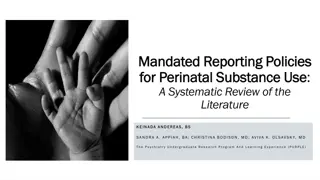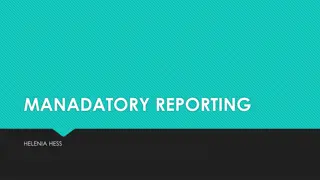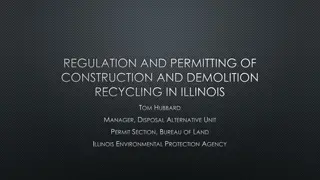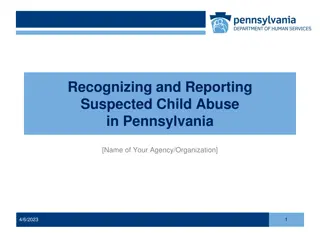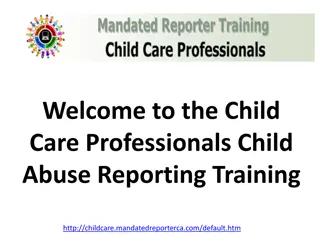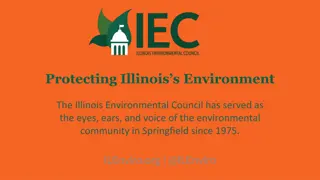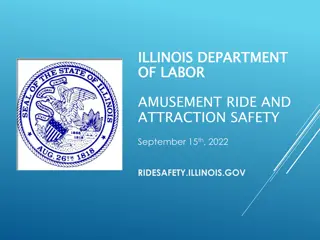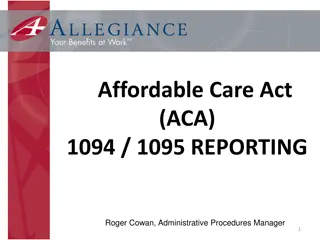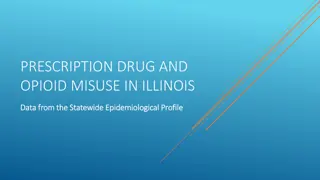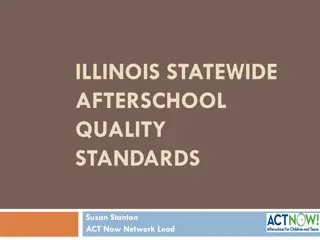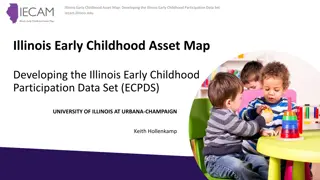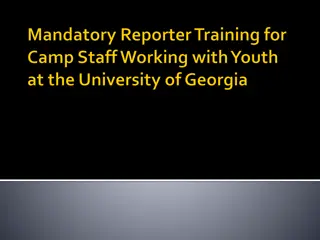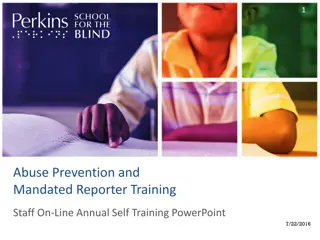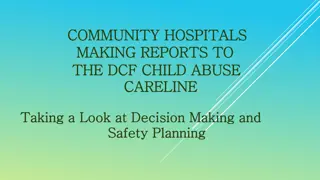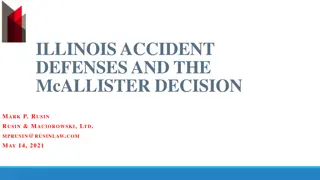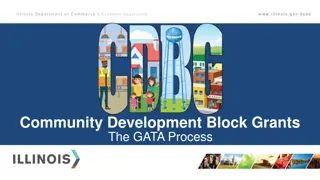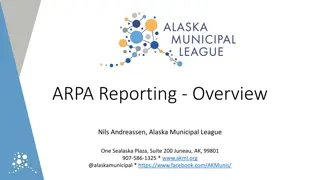Illinois Child Reporting Act Mandated Training Guidelines
The Illinois Abused and Neglected Child Reporting Act (ANCRA) mandates all higher education institution personnel to understand and report abuse or neglect of minors. University staff must acknowledge their reporting responsibilities, complete training every three years, and report suspicions to the Department of Children and Family Services. The University of Illinois prioritizes the protection of minors on campus, designating all personnel as mandated reporters. Training material is provided to educate staff on recognizing and reporting child abuse.
Download Presentation

Please find below an Image/Link to download the presentation.
The content on the website is provided AS IS for your information and personal use only. It may not be sold, licensed, or shared on other websites without obtaining consent from the author. Download presentation by click this link. If you encounter any issues during the download, it is possible that the publisher has removed the file from their server.
E N D
Presentation Transcript
Effective in 2012, the Illinois Abused and Neglected Child Reporting Act (ANCRA) requires all personnel of higher education institutions to acknowledge their understanding of their mandated reporting requirements should they witness or suspect abuse or neglect of a minor. Effective in 2019, ANCRA requires that all mandated reporters complete ANCRA training every three years. This material is intended to provide you with a basic understanding of the requirements and contains an acknowledgement which confirms your understanding of your reporting responsibilities. Regardless of your past training, review of this material and the acknowledgement is required and will be retained by the University as a permanent personnel record throughout your employment. Based on your position or role within the University, your department may require you to complete a more comprehensive education program on this topic. 2
Children may be on campus for a variety of reasons. Some examples of activities they frequently participate in include: University Student Under the Age of 18 The University of Illinois Policy Protection of Minors requires University personnel to report suspected abuse or neglect of any minor known to the employee in his or her official capacity, including those minors who are enrolled at the University or who have been accepted for enrollment at the University. Summer camp Patient or visitor at the university hospital College prep class 4-H Sports camp Campus visitor Music camp Patient or visitor at a hospital clinic University Student Under the Age of 18 3
The University of Illinois recognizes a fundamental obligation to protect minor children (children under the age of 18), the youngest and potentially most vulnerable members of our community, when they are on University premises participating in University programs, or are in the care of University staff. ANCRA designates ALL University personnel as mandated reporters. This designation applies to all University personnel regardless of title, salary, level of interaction with youth, or percentage of appointment and may include volunteers. As a mandated reporter, you are required by law to report cases of suspected child abuse or neglect of minors to the Department of Children and Family Services (DCFS) via the DCFS Hotline at: 1 1- -800 (1 800- -25 (1- -800 25- -ABUSE 252- -2873) ABUSE 2873) 800- -252 DCFS has established definitions of the types of abuse that require reporting, and these definitions will be further explained in the following pages of material. 4
The remaining training content was developed and provided by the Department of Children and Family Services in their training, Recognizing and Reporting Child Abuse: Training for Mandated Reporters . 5
Current mandated reporters fail to report more than half of their suspicions of child maltreatment. Studies consistently conclude mandated reporters indicate a lack of understanding of reporting procedures and indicators of abuse and neglect as reasons for failure to report. This training and the frequency of training helps to ensure that we work to prevent these gaps in reporting. The Illinois Department of Children and Family Services believes Safety First, Safety Always. 6
Illinois law requires all Mandated Reporters to call the DCFS Hotline if they have reasonable cause to believe that a child know to them, in their professional or official capacity, may be abused or neglected. Be clear about what your role is, and what it is not. As a mandated reporter, it is your legal obligation to report your suspicions to DCFS. It is not your role to investigate what the child has told you. 7
Possibly as high as 60% of child abuse and neglect is never reported. Illinois accepts around 70,000 reports per year, impacting more than 100,000 children. If the under reporting studies are correct, this number only reflects 1/3 of the child abuse and neglect that may actually be occurring in our state. Early detection and intervention may prevent further abuse, neglect and CHILD DEATHS. If Mandated Reporters do not recognize the signs of child abuse and neglect and report their suspicions to the Hotline, intervention and treatment may not be possible. As a Mandated Reporter, YOU play a crucial role in protecting children in Illinois. 8
You will fulfill your legal obligation as a Mandated Reporter when you call the DCFS Hotline: 1-800-25-ABUSE 1-800-252-2873 1-217-524-2606 TTY: 1-800-358-5117 If the report is a criminal matter, and it is outside of DCFS s jurisdiction, the Hotline will ask you to notify the police. 9
To help answer the question, What is Child Abuse and Neglect?, remember that four key criteria must exist for the DCFS Hotline to accept a report: The alleged victim is under the age of 18. The alleged perpetrator is any individual residing in the child s home, any person responsible for the child s welfare, or anyone who came to know the child through a position of trust. A specific incident or specific set of circumstances raises suspicion that a child has been abused or neglected. The child was harmed or is at substantial risk of physical or sexual injury. 10
While an alleged perpetrator is the person who either directly causes or allows child abuse or neglect to occur, there are different definitions. For DCFS purposes, this includes any individual residing in the child s home, any person responsible for the child s welfare, or anyone who came to know the child through a position of trust, such as mother, father, teacher, counselor, or coach to name a few. If the perpetrator does not fit within one of the above categories, the incident may be a crime but it is not classified as child abuse. For criminal matters a perpetrator could be anybody. If you are not sure that a situation meets these criteria, call the Hotline anyway. It is DCFS s job to assess the situation. 11
Physical abuse occurs when a parent or person responsible for a minors welfare: Inflicts a physical injury to a child that is non-accidental, including bruises, bites, bone fractures, cuts, welts, and burns; Creates or allows a substantial risk of physical harm to a child; Violates a court order that prohibits the perpetrator from having access to the child; Deliberately inflicts cruel or unusual treatment which results in physical or mental suffering by the child; Inflicts or allows excessive corporal punishment. (NOTE: If a parent or caretaker causes physical injury during overly harsh discipline, it does not matter that he or she did not intend to hurt the child); Gives or allows a controlled substance to be given to a child under 18 years of age; Exposes the child to the manufacture of methamphetamine 12
Possible signs of physical abuse are: Unexplained marks on the body (cuts, bruises, welts, burns, black eyes, fractures or dislocations) Bruises or welts in various stages of healing, or in clusters or patterns in the shape of an object, like a belt or an electrical cord Pattern burns, such as cigarette burns, iron burns, burns in the shape of a specific object, or scald burns in an immersion pattern Marks hidden from typically exposed areas of skin Other children may show more subtle indicators, such as behavioral changes including: Extreme vigilance or watchfulness Bullying smaller children Poor social interactions with peers Extreme fear of parents or caregivers (e.g. does not want to go home) 13
Sexual abuse occurs when a parent or a person responsible for the child s welfare commits any of the following acts: Sexual penetration. This means any contact between the sex organ of one person and the sex organ, mouth, or anus of another person. Acts include vaginal, and oral sex. Sexual molestation of a child. This occurs when the perpetrator touches the child or asks the child to touch him for the sexual gratification or arousal of the perpetrator or the child. Examples include fondling a child or having the child fondle the perpetrator. Sexual exploitation. This is the sexual use of a child for sexual arousal, gratification, advantage or profit, as defined by DCFS. It includes child pornography, forcing a child to watch sex acts, or exposing genitals to a child. 14
Possible Signs of Sexual Abuse Include: Sexual knowledge beyond what is age appropriate Recurring pain or itching in genital or anal areas Sexually transmitted diseases Frequent bladder or urinary tract infections Genital injury Unexplained regression or fear Sexual acting out behavior NOTE: Sexual predators often abuse children in ways that do no leave physical signs, such as fondling the child, exposing themselves to the child, or having the child perform sexual acts on the adult. Even sexual penetration of a child does not always leave obvious signs of abuse. 15
Illinois enforces minimum parenting standards." According to DCFS, neglect occurs when a parent or responsible caretaker fails to provide these minimum requirements for his or her child: Adequate supervision Medical care/attention Food Clothing Shelter Neglect may also include significantly delaying the provision of these necessities (such as failing to take a child who has a broken bone for medical treatment). Other forms of neglect include taking illegal drugs during pregnancy, placing a child at risk of harm, or exposing a child to hazardous living conditions. Any child who is present during the manufacture of methamphetamine is considered abused and/or neglected. 16
Possible Signs of Neglect Include: Often hungry in the morning Poor hygiene Evidence of none or poor supervision Underweight, poor growth, failure to thrive Dressed inappropriately for the weather Erratic attendance at school 17
Definition: Sex trafficking in which commercial sex act is induced by force, fraud, or coercion, or in which the person induced to perform such act has not attained 18 years of age; or the recruitment, harboring, transportation, provision, or obtaining of a person for labor or services through the use of force, fraud, or coercion for the purpose of subjection to involuntary servitude, peonage, debt bondage or slavery. 18
Possible Signs of Human Trafficking Include: The youth has recent signs of physical abuse and/or sexually transmitted infections. Suspicious tattoos/branding on the neck and lower back. Small children serving in a family restaurant Appearing malnourished. Avoiding eye contact, social interaction, and authority figures/law enforcements. Seeming to adhere to scripted or rehearsed responses in social interaction. Lacking official identification documents. Appearing destitute/lacking personal possessions. Checking into hotels/motels with older males, and referring to those males as boyfriend or daddy, which is often street slang for pimp. Working excessively long hours. Living at place of employment. 19
The damage caused by psychological abuse may be just as serious as any other form of abuse and neglect. DCFS recognizes that emotional trauma is an element in many abuse and neglect situations. In Illinois, psychological, mental or emotional abuse is known as Mental Injury and may only be reported by licensed medical and mental health professionals, including: Psychiatrists Registered Psychologists Medical Doctors Registered Nurses Certified Social Worker School Teachers Therapists and Counselors employed in a community health agency or social work agency If you suspect mental injury, but you are not one of these licensed professionals, it may be appropriate to refer the child to a qualified reporter for an assessment. If you are not in a position to make a referral, you may want to consult with your supervisor, manager, or licensing representative. 20
The definitions and the signs of child abuse and neglect are available on the DCFS s website. 21
Actually, ALL children are at potential risk of child abuse. However, the following groups tend to be more vulnerable. Preschool Children Children with Disabilities Gay, Lesbian, Bisexual, Transgender and Questioning Youth. 1) 2) 3) 22
It is also important to understand what is NOT child abuse or neglect. Some people make reports that DCFS does not legally recognize as child abuse. Here are some examples of situations that do not fall within DCFS s mandate to investigate child abuse: Certain Sexual Behaviors In Children Are Normal And Age Appropriate Children who are curious about their own bodies Preschool children who giggle while touching their bodies in an exploratory manner Children of the same age and developmental stage who are curious about and explore each other s bodies Certain Sexual Behaviors In Children Are Normal And Age Appropriate 23
Certain Family Circumstances Are Not Considered Abusive or Neglectful Certain Family Circumstances Are Not Considered Abusive or Neglectful Spanking that is not excessive corporal punishment because it does not leave marks or injuries A dirty home that is not hazardous An older child left home alone who is capable of caring for himself A child left in the care of an adult relative who has often cared for the child in the past, even if the parent has not made an arrangement for child care A child who a licensed physician reasonably believes is 30 days old or less at the time the child is initially relinquished to a safe haven. 24
When in doubt, MAKE A CHILD ABUSE REPORT and let DCFS do its job by investigating! 25
You may be the person a child chooses to tell if s/he is being abused or neglected. Remember, the best indicator that a child is being abused is the child s own spontaneous report. When a child reports abuse, it can be stressful, not only for the child, but also for you the person hearing about it. When this occurs it is important to recognize the significance of the event to the child s safety and journey to recovery. 26
Body Language Come down to the child s level when you are talking to him/her. Try to be on the same eye level as the child. Respect the child s space. Do not lean in too close to the child when he or she is speaking. Facial Expressions When listening to a child, be aware of your facial expressions. Although you may feel shocked, try to maintain a calm expression. 27
Never Put Words in a Childs Mouth Asking leading questions can harm the child and damage the investigation. For example, if a child says, My dad hurt me. Do not ask touch you in your private part? instead ask, how did your dad hurt you? Do not ask, did your dad Limit Your Questioning It is important to limit the number of times a child is questioned or interviewed about an abuse or neglect incident. Multiple interviews can traumatize the child and should be avoided at all costs. Multiple interviews, if not done appropriately, may have a negative impact on a DCFS investigation and criminal investigation. It is crucial to leave the interview process in the hands of a trained professional investigator. Remember, all you need is reasonable cause to believe that abuse or neglect occurred in order to call the Hotline. 28
Extensive interviews of a child about an abuse incident can traumatize the child and have a negative impact on the investigation, if not done appropriately. After the report is made, a trained professional interviewer will conduct and interview of the child. Multiple interviews of a child can be traumatizing and should be avoided at all costs. Myth Busters Sometimes when children make a disclosure of abuse or neglect, they later say nothing happened. This does not always mean that the child was not initially telling the truth. Sometimes recanting is a natural reaction for children because there may be factors influencing the child to change their story. For example, being frightened, parent pressure, or perpetrator threats may cause the child to change their story. 29
When 2 or more persons who work within the same workplace and are required to report under this Act share a reasonable cause to believe that a child may be an abused or neglected child, one of those reporters may be designated to make a single report. The report shall include the names and contact information for the other mandated reporters sharing the reasonable cause to believe that a child may be an abused or neglected child. The designated reporter must provide written confirmation of the report to those mandated reporters within 48 hours. If confirmation is not provided, those mandated reporters are individually responsible for immediately ensuring a report is made. Nothing in this section precludes or may be used to preclude any person from reporting child abuse or child neglect. 30
As a Mandated Reporter, you have specific rights: To the Hotline worker s full name To speak to the Hotline worker s supervisor if you do not agree with the Hotline worker s decision To request a review of an investigation that has been unfounded if there are concerns regarding the adequacy of the investigation To receive information about the findings and actions taken by the Department during the investigation, including actions taken to ensure a child s safety Myth Busters Many Mandated Reporters believe that when they make a child abuse report the child will be removed from their family. In fact, less than 5% of children reported for abuse or neglect are removed from the home and usually it is not long term. For those who are not removed, their families are provided with services to ensure the safety of the child. 31
As a Mandated Reporter, if you make a good faith report to the Hotline, you are entitled to immunity from legal liability. The means you cannot be successfully sued by the parent or the alleged perpetrator, even if your report is not indicated. The law presumes you reported in good faith. To successfully sue you, the parent or perpetrator would have to prove that you willfully lied. Myth Busters Some Mandated Reporters believe they can t make an anonymous call to the Hotline. Like the general public, Mandated Reporters do have the right to make reports to the Hotline anonymously. Before you make this decision, know all the facts. 1. The investigator will not be able to contact you to verify your information or gather any additional information you may have. This weakens the investigation. 2. You cannot be notified of the results of the investigation because no one will know how to reach you. 3. Also, if something happens to the child, you will have no legal proof that you fulfilled your role as a Mandated Reporter. 32
Although you may feel nervous about calling the Hotline, please remember that you play a critical role in protecting children from abuse/neglect. You hold the key to keeping children safe. 33
Animal Abuse There is growing evidence that people who abuse animals also abuse other people. Research indicates strong links between animal abuse, domestic violence and child abuse. Animal abuse is one of the four indicators that the F.B.I. profilers use to assess future violent behavior. 88 percent of homes where children were physically abused, pets were mistreated too. In Illinois, there is now a joint agreement between the Department of Agriculture and DCFS regarding reporting abuse. Animal control officers or humane society investigators and Department of Agriculture investigators are now Mandated Reporters. If they have reasonable cause to suspect or believe that a child is being abuse or neglected or is in danger of being abused or neglected, they must immediately make a written or oral report to the Department of Children and Family Services. Conversely, DCFS Investigation Specialists, Intact Family Specialists, and Placement Specialists who reasonably believe that an animal observed by them when in their professional or official capacity is being abused or neglected must immediately make a written or oral report to the Department of Agriculture s Bureau of Animal Health and Welfare. In both cases, the law provides for immunity and confidentiality if the reports were made in good faith. 34
To report suspected Animal Abuse, call the Animal Abuse Hotline: 217-782-6657. 35
When in doubt, MAKE A CHILD ABUSE REPORT and let DCFS do its job by investigating! 36
We hope this training has helped you learn how to fulfill your Mandated Reporters role. The responsibility for protecting our children rests with all of us but, as a Mandated Reporter, you play the following unique roles in ensuring the safety of our children and the strengthening of our families. Making a Report: You are the eyes and ears to recognize signs of abuse and neglect and call the Hotline to make a report. Following a Report That is Indicated: You may be asked to share new information about a child s safety and welfare with the caseworker or make a new report, if there is a new abuse or neglect incident. During an Investigation: You may be contacted for information related to an ongoing investigation. 37
All University of Illinois employees should understand and follow these steps: If you have reasonable cause to believe that a minor has been abused or neglected at the University or at a University sponsored event, you MUST immediately contact the DCFS Hotline at 1 1- -800 have the right to make reports to the DCFS Hotline anonymously. After DCFS is notified, you must also promptly notify University Police that a report has been made. Please make note of your campus police phone number: UIC: UIS: UIUC: 1. 800- -25 25- -ABUSE ABUSE. Like the general public, mandated reporters do 2. 312-996-2830 217-206-6690 217-333-1216 Please remember that in emergencies, all members of the University community are expected to call the police or 911. Please use your best judgment. To record your completion of this course, you must complete the next slide, and submit it to your university or system human resource office. 38
University of Illinois Employee or Affiliate Acknowledgement Form Please print all information except the last line which requires your signature. NAME: _____________________________________________________________ BIRTHDATE: _____________________________________________________________ 9-Digit UIN: (if applicable) _____________________________________________________________ POSITION: _____________________________________________________________ CAMPUS: (Chicago, Springfield, Urbana) _____________________________________________________________ DEPARTMENT: _____________________________________________________________ My below signature indicates that I have reviewed the education material contained in 2021 University of Illinois Triennial Paper-Based ANCRA Training . SIGNATURE: _____________________________________________________________ 39



